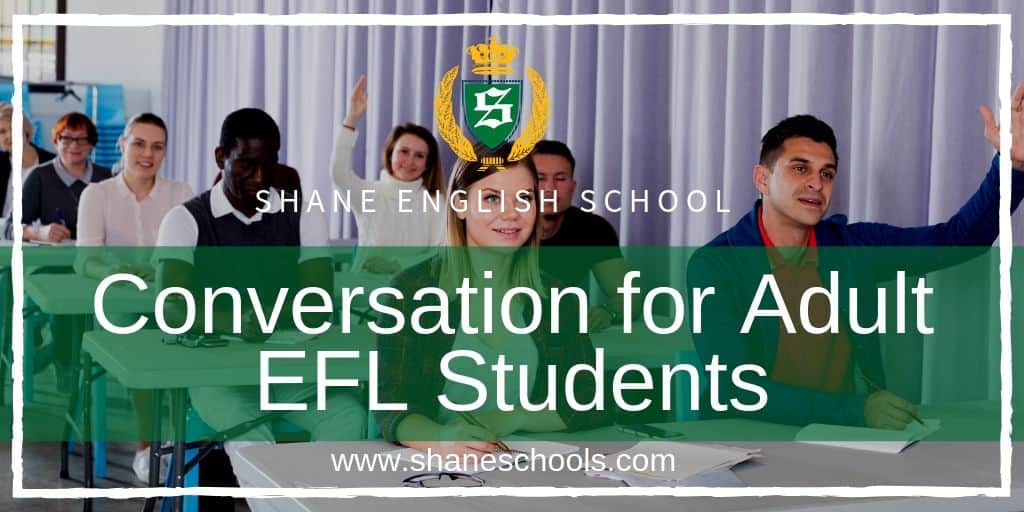A conversation stage should be seen as an integral part of virtually all adult lessons. Conversations will range from the very guided session with low-level students to freer and less structured chats with higher levels. The teacher needs to bear in mind the level and capabilities of the students when planning a conversation stage.
Conversation lessons are often ignored for more practical subjects like reading, writing, and test preparation. But nothing is more important than being able to communicate effectively in English. For most people, the bulk of their communication happens in conversation.The ability to have comfortable, fluent conversations with English speakers is one of the most valuable skills an English student can learn.
The Value of Conversation for Adult EFL Students
Conversation should be viewed with regard to its value as:
- A warmer
- Variation from book work
- Revision of known material
- Practice of English in a realistic context
More about Shane English Schools courses for adults.
How to Use Conversation for Adult EFL Students
Conversation should be used to complement book work, only exceptionally to replace it – otherwise, the structure and progression offered by a course book will be lost. If handled appropriately, it will be enjoyable and motivating for the students.
The teacher needs to act as facilitator and co-communicator, not as a lecturer. Bear communication patterns (Teacher-Students, Teacher-Student, Students-Teacher, Student-Teacher, Student-Student) in mind.
It is the responsibility of the teacher to ensure that the students have something to talk about in order for a conversation to flow. There are clearly many ways to achieve this – the following ideas may be useful:
- Encourage students to keep a diary on a daily or weekly basis, and read some or all of it out in class. It is important that the reader is interrupted frequently by other students (preferably) or by the teacher, for questions or to ask for clarification, repetition, etc.
- Similarly, students can be asked to write a short paragraph at home, for presentation to the class, about:
- a hobby
- a trip
- a book, film, etc.
- a cultural site or event
- any other topic of interest.
- The speaker should be frequently interrupted in order to more closely resemble a natural conversation. Illustrations such as photos, tickets, and souvenirs are to be encouraged.
- Students of Intermediate level or higher can be asked to give one-minute talks, with minimal preparation, on a topic named by the teacher or drawn from a hat. Suitable topics might include these: my pet; the happiest day of my life; the worst day of my life; my job; my family; etc. Many IELTS books have appropriate topics as it forms part of the students speaking assessment.
- Board games such as ‘Tell Us About’.
- Newspaper or magazine articles. These are best read at home then discussed in class. Guidance in the form of questions relating to content and meaning are important.
- Other written or photocopied materials, information transfers, and pictures to exploit.
- Role plays, but these will need very careful setting up.
- Oral games e.g. ’20 Questions’, ‘Yes / No’ game, etc.
- Questionnaires, quizzes, surveys e.g. ‘Have you ever ..?’, ‘Find someone who …’.
- Encourage both prediction and follow-up questions.
- Insist on an ‘A+’ answer every time, i.e. insist on an extra piece of information, or a follow-up question, over and above the answer to any question. Thus the answer to, “Do you like chocolate cake?” will be not simply, “Yes, I do,” but, “Yes, I do. How about you?” or, “Yes, I do. But I prefer fruit cake.”
- As a way of encouraging students to participate in conversations by asking questions, issue three or four question marks on separate pieces of paper to each student at the start of the lesson. Every time they ask a question, they give you back one of the question marks. The object is for everyone to use up all their question marks by the end of the lesson.
By no means is this a complete list of activities. For more speaking practice ideas, you could also try using songs to teach adult students. Or you could follow us on Facebook or Twitter to get updates.
A version of this article originally appeared in Shane English School’s Teaching English to Young Learners (TEYL) program, which is part of new teachers’ orientation.
Do you have a tip or trick to add? Let us know on Twitter!

We're hiring!
With schools around the world, Shane English School always has exciting new opportunities to offer.


